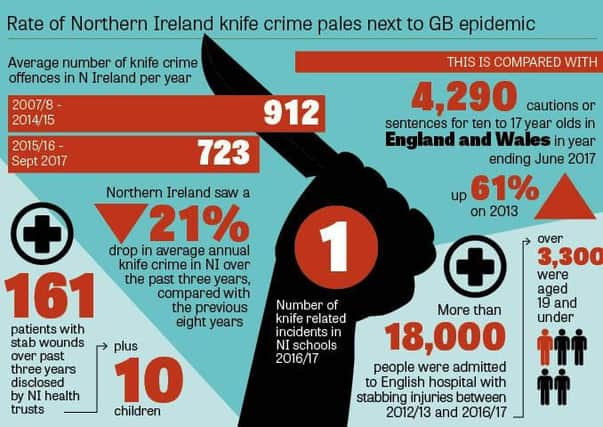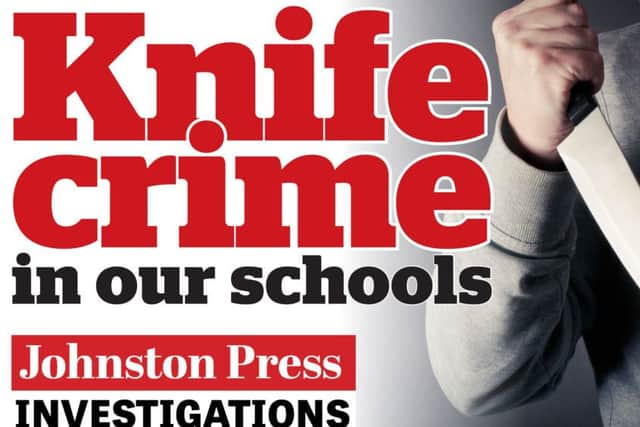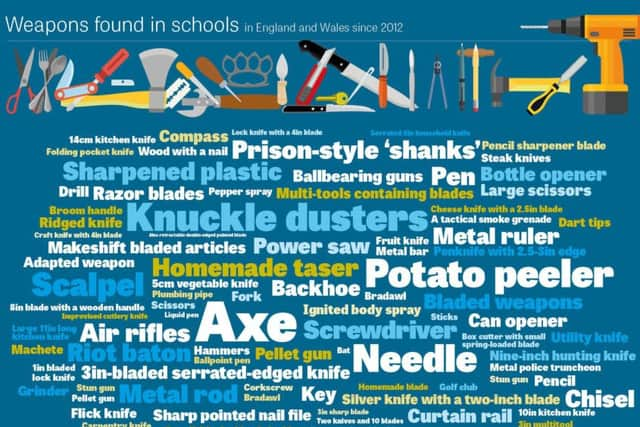Knife crime: why is it absent from Ulster schools?


The total number of children found in possession of knives in schools in England and Wales is now over 2,000 since 2012 – with over 3,00 knife crimes.
However, in Northern Ireland the figures are in stark contrast, with only around one conviction a year for possession of a knife on school premises.
Advertisement
Hide AdAdvertisement
Hide AdToday, leading figures in Northern Ireland give their views on why schools should be so safe here by comparison.


Koulla Yiasouma, Northern Ireland Commissioner for Children and Young People, gives a range of reasons.
“Closer knit communities here produce a culture where communities may be safer, but are also better equipped to support young people at risk of committing crime,” she told the News Letter.
Restorative justice approaches and a “much better” youth justice system are also positive factors here.
Advertisement
Hide AdAdvertisement
Hide Ad“Therefore we have a more commonsense, and an appropriate pastoral care type approach in schools to early criminal activity by young people. In turn, this means there is less chance for the type of crime young people get involved with to escalate – including knife crime in schools. This is a good news story for Northern Ireland, but we still have a long way to go to improve what could be one of the best youth justice systems in the world.”


Rosemary Craig, lecturer in law at Ulster University, has a special interest in knife crime.
“I think there is a great vigilance by school heads about what weapons might be carried into schools,” she gave as one factor. “Also there is not a knife culture in Northern Ireland as prevails in Great Britain. Therefore there is not an awareness [of knife crime].”
Another factor could be the absence of ‘gang culture’ which exists in Great Britain, possibly due in part to paramilitaries here. “There is also a perception in Northern Ireland that one may encounter someone carrying a firearm, real or imitation, if one produces a knife,” she added.
Advertisement
Hide AdAdvertisement
Hide AdA professional who works with young people in Belfast concurred that paramilitaries are a factor. “I think with punishment beatings and shootings here there is a ‘fear’ among some of the young people about using a knife,” he said. “Some young people have said to me “for f**** sake, you would get a bateing or an OBE [one bullet behind the ear] if you had a blade.”


A young man in his 20s from a strongly republican area of Belfast agreed.
“There would always have been a subconscious fear of paramilitaries among young people,” he said. “You knew there were lines you would not cross and carrying a knife would be one of them.
“Paramilitaries controlled everything. They would tolerate minor anti-social behaviour, but only as long as it wasn’t too widespread.”
Advertisement
Hide AdAdvertisement
Hide AdPastor Jack McKee is senior pastor at New Life City Church on the peace line in west Belfast. He was not aware of any significant level of knife crime among schoolchildren in his area.


“The only ones who seem to use weapons here are paramilitaries, and those weapons are guns or hammers or table legs,” he said.
A teacher who has taught in a Belfast secondary school and now teaches in London said knife crime is sometimes imported into Great Britain.
“For Belfast school kids, if nobody else has knives then you don’t need a knife to defend yourself,” he said.
His London school has a metal detector to keep knives out.
Advertisement
Hide AdAdvertisement
Hide Ad“In my view, what often happens in London is that we have kids from overseas, where a knife culture is quite normal, and when they come to the UK they bring it here with them.”
Former PSNI Detective Chief Superintendent Norman Baxter highlighted the educational work of the PSNI as a significant factor, as it has repeatedly rolled out educational schools programmes over the past decade.
“Juvenile knife crime in England seems to be a major issue in densely populated inner city areas with high levels of poverty and social deprivation,” he said.
“In addition, there is a related gang culture with competing gangs in close proximity.”
Advertisement
Hide AdAdvertisement
Hide AdSchools in such areas may be dramatically different to Northern Ireland, with 1,500-2,000 pupils each.
“The turnover of teachers in London schools in 2017 was 13% and there are schools where the majority of pupils do not have English as a first language,” he said.
“It would therefore appear that the social cohesion in schools in inner cities is less stable than in Northern Ireland and the social and racial tensions within that community spill over into violence within schools.”
DUP Lagan Valley MP Sir Jeffrey Donaldson also said PSNI educational campaigns are having an impact.
Advertisement
Hide AdAdvertisement
Hide Ad“Whilst it is welcome news that knife crime is considerably lower here than in Great Britain, we cannot become complacent,” he added.